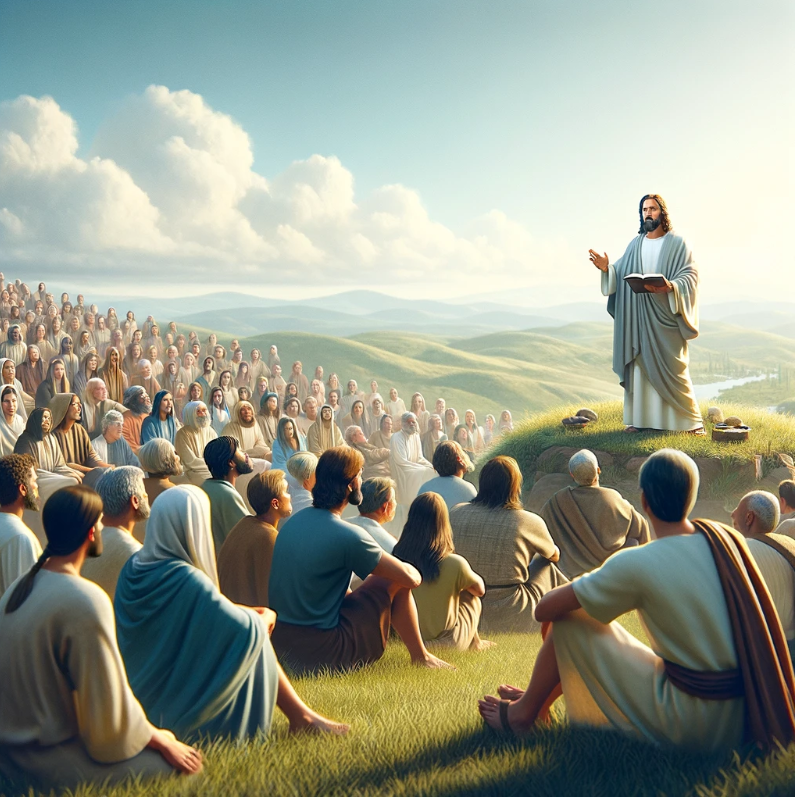
The Beatitudes are found in the Bible in the Gospel of Matthew, chapter 5, verses 1-12.
Matthew 5:1-12
And seeing the multitudes, he went up into a mountain: and when he was set, his disciples came unto him: And he opened his mouth, and taught them, saying, Blessed are the poor in spirit: for theirs is the kingdom of heaven. Blessed are they that mourn: for they shall be comforted. Blessed are the meek: for they shall inherit the earth. Blessed are they which do hunger and thirst after righteousness: for they shall be filled. Blessed are the merciful: for they shall obtain mercy. Blessed are the pure in heart: for they shall see God. Blessed are the peacemakers: for they shall be called the children of God. Blessed are they which are persecuted for righteousness’ sake: for theirs is the kingdom of heaven. Blessed are ye, when men shall revile you, and persecute you, and shall say all manner of evil against you falsely, for my sake. Rejoice, and be exceeding glad: for great is your reward in heaven: for so persecuted they the prophets which were before you.
Matthew 5:1-12
What meaning and importance do the beatitudes have in the Bible?
The Beatitudes, found at the beginning of Jesus’ Sermon on the Mount in Matthew 5:1-12, are like a beautiful doorway into understanding what Jesus sees as true happiness and blessing. Think of them as Jesus’ way of saying, «This is what it looks like to live a life that’s close to God.» It’s not about having a lot of stuff, being super popular, or always feeling happy. Instead, Jesus flips everything on its head and says that real blessings come in ways we might not expect.
First off, Jesus talks about being «poor in spirit.» This doesn’t mean lacking money or resources. It’s about recognizing that we need God in everything. It’s like saying, «God, I can’t do this on my own. I need you.» And when we realize this, Jesus tells us the kingdom of heaven is ours.
Then, Jesus mentions those who mourn, and it’s not just about feeling sad when something bad happens. It’s a deeper kind of sorrow for the wrongs in the world and in our lives. Jesus promises comfort to those folks, showing that God’s heart is close to the brokenhearted.
Being «meek» isn’t about being weak. It’s about having power but choosing to use it with gentleness and self-control. Jesus says the meek are going to inherit the earth, which is pretty amazing. It’s like saying the ones who don’t push and shove to get ahead are the ones who truly win in the end.
When Jesus talks about those who «hunger and thirst after righteousness,» he means people who crave to see fairness and goodness in the world as much as we need food and water. And the promise? They’ll be filled. It’s like God saying, «I see that deep desire for what’s right, and I’m going to satisfy it.»
The merciful get mercy. It’s pretty straightforward. Show kindness and forgiveness, and you’ll find it coming back to you. And the pure in heart? They get to see God. Imagine that. Living with a clean heart means you’re on the path to seeing God in a way others can’t.
Peacemakers are called God’s children. It’s a special title for those who don’t just avoid conflict but actively work to make peace. It’s like being known as part of God’s family because you’re spreading peace just like He does.
Lastly, Jesus talks about those who are persecuted for doing what’s right. It’s tough to think about, but Jesus says that when we’re treated badly for following Him, we’re actually blessed. We’re in good company with the prophets and many others who stood up for God throughout history.
So, these Beatitudes aren’t just nice sayings. They’re a radical call to live in a way that might seem upside down to the world but is right side up to God. It’s about finding true happiness and blessing not in what we have but in how we live with God and with each other.
